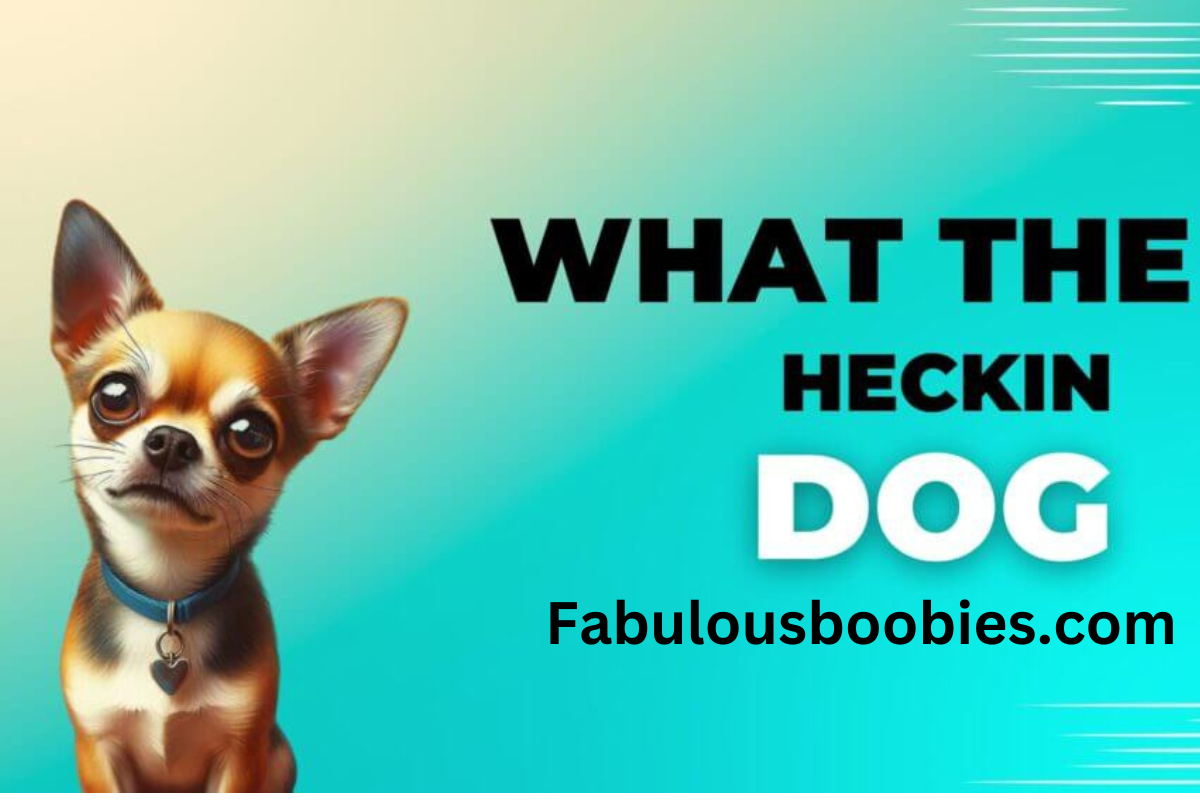NEWS
What The Heckin Dog Really Means

Have you ever come across the phrase “What The Heckin Dog” and found yourself puzzled by its meaning? Well, you’re not alone! This quirky expression has been causing a buzz on social media and internet forums, leaving many wondering about its origins and significance. In this blog post, we’ll dive deep into the accidental misuse, controversies, interpretations, memes, and overall fascinating world of “What The Heckin Dog.” So buckle up as we unravel the mystery behind this intriguing phrase!
Accidental Misuse and Controversies Surrounding the Term
The term “What The Heckin Dog” has sparked some unintended confusion and controversy due to its unusual wording. Originally stemming from a playful mix of expressions, it quickly gained momentum on social media platforms, leading to various interpretations. Some users mistakenly associated it with profanity or inappropriate language, stirring debates about its appropriateness in certain contexts.
Despite the innocent origins of the phrase, misunderstandings and misinterpretations have fueled heated discussions online. While some embrace its quirky charm, others argue that it may inadvertently convey a different message than intended. As with many internet phenomena, the line between humor and controversy can sometimes blur when phrases like these enter mainstream discourse.
Navigating through the accidental misuse and controversies surrounding “What The Heckin Dog” sheds light on how language evolves in digital spaces. It serves as a reminder of the power words hold in shaping perceptions and sparking debates within online communities.
Origins of the Phrase
Have you ever wondered where the phrase “What The Heckin Dog” actually comes from? Well, let’s dive into its intriguing origins. Surprisingly enough, this quirky expression didn’t just materialize out of thin air – it has a story behind it.
Some believe that the term originated as a playful twist on more traditional phrases like “What the heck” or “What the heck is going on.” By incorporating ‘dog’ into the mix, it adds an element of whimsy and humor to an otherwise mundane expression.
The exact moment when this phrase first entered internet culture remains somewhat murky. However, its rise in popularity can be attributed to social media platforms like Twitter and Instagram, where users often incorporate it into their posts for comedic effect.
Understanding the origins of “What The Heckin Dog” sheds light on how language evolves and adapts over time. It’s fascinating to see how a simple phrase can take on new meaning in today’s digital age.
Popularity and Spread on Social Media
The phrase “What The Heckin Dog” quickly gained traction on social media platforms, capturing the attention of users across the internet. Its quirky and playful nature resonated with people looking for a lighthearted way to express surprise or confusion.
As memes featuring the phrase started circulating, its popularity soared even higher. Users found creative ways to incorporate it into their posts, adding humor and charm to their online interactions.
With each share and retweet, “What The Heckin Dog” continued to spread like wildfire, becoming a viral sensation in no time. Its infectious appeal crossed borders and language barriers, uniting individuals from diverse backgrounds under a common expression of amusement.
Social media users embraced the phrase wholeheartedly, using it as a go-to reaction for moments that warranted an exclamation of disbelief or astonishment. Its versatility made it adaptable to various situations, making it a staple in online conversations worldwide.
Interpretations and Meanings of the Phrase
Have you ever wondered about the various interpretations and meanings behind the phrase “What The Heckin Dog”? It’s fascinating how a simple combination of words can evoke different emotions and thoughts among people. Some may see it as a playful expression of surprise or confusion, while others might interpret it as a humorous way to convey disbelief.
The beauty of language is its ability to be interpreted in multiple ways, allowing for creativity and individuality in communication. For some, saying “What The Heckin Dog” may simply be a fun and lighthearted exclamation, adding color to everyday conversations.
In the realm of internet culture, this phrase has taken on a life of its own, being used in memes and social media posts to generate laughs and engagement. Its versatility makes it appealing for sharing across various platforms, resonating with audiences who appreciate quirky humor.
The interpretations and meanings attached to “What The Heckin Dog” showcase the dynamic nature of language and how words can spark different reactions depending on context.
Controversies and Criticisms
Controversies and criticisms surrounding the phrase “What The Heckin Dog” have sparked debates in online communities. Some argue that the term is overused and has lost its original charm, while others defend it as a lighthearted expression of surprise or confusion.
Critics claim that the phrase perpetuates internet slang that lacks depth or meaning, overshadowing more substantial language use. They view it as a symptom of linguistic laziness and a decline in communication standards.
On the other hand, supporters suggest that language naturally evolves over time, embracing new expressions to reflect contemporary culture. They argue that “What The Heckin Dog” adds humor and relatability to everyday interactions online.
Despite differing opinions, one thing is clear – discussions about language usage will always provoke diverse reactions among users.
Usage in Memes and Internet Culture
Memes and internet culture have played a significant role in popularizing the phrase “What The Heckin Dog.” From funny dog videos to relatable pet owner struggles, the phrase has found its way into countless memes shared across various social media platforms.
Users often pair the phrase with hilarious images or videos of dogs caught in quirky situations, creating a sense of humor that resonates with many online audiences. This light-hearted and playful approach to expressing surprise or confusion has contributed to the widespread appeal of “What The Heckin Dog.”
In addition to memes, influencers and content creators have also adopted the phrase in their videos and posts, further solidifying its presence in internet culture. Whether it’s used as a caption for a cute puppy pic or incorporated into comedic skits featuring dogs, this expression continues to captivate online communities.
The versatility of “What The Heckin Dog” allows users to infuse their own creativity and humor into their content while tapping into a shared language that connects them with fellow dog lovers worldwide.
Is it Acceptable to Use
As with any slang term or phrase, the acceptability of using “What The Heckin Dog” depends on the context and audience. Some may find it endearing and humorous, while others might see it as silly or overused. It’s important to consider how the phrase will be perceived by those around you before incorporating it into your vocabulary.
In casual conversations with friends who understand internet culture, dropping a “What The Heckin Dog” here and there can add a playful touch to your interactions. However, in more formal settings or professional environments, it’s best to stick to more conventional language to avoid any misunderstandings or raised eyebrows.
Whether using this phrase is acceptable comes down to personal preference and appropriateness for the situation at hand. Just remember that language is always evolving, so what may be trendy today could easily become outdated tomorrow.
Also Read: The Muppet with the Long Hooked Beak: A Journey Through Time
Conclusion: Embracing Language Evolution
As language continues to evolve, phrases like “What The Heckin Dog” showcase how internet culture can influence everyday speech. While some may criticize its informal nature or overuse, it’s essential to recognize that language is fluid and constantly changing. Embracing these linguistic shifts allows us to connect with others in new and exciting ways.
So next time you hear someone exclaiming “What The Heckin Dog,” remember that it’s not just a quirky phrase – it’s a reflection of our ever-changing communication landscape. Let’s celebrate the creativity and adaptability of language as we navigate the digital age together. Who knows what fun expressions will pop up next? Stay curious, stay open-minded, and keep embracing language evolution!
NEWS
Ximena Brittan Gunusen People Search Made Easy

Searching for someone online has become a common practice, especially in today’s digital era where a wealth of information is available at our fingertips. When it comes to a Ximena Brittan Gunusen people search, many are looking for ways to uncover accurate details quickly and effectively. Whether you’re reconnecting with a long-lost friend, researching someone for professional reasons, or seeking background information, this guide will walk you through everything you need to know.
With the rise of advanced people search tools and techniques, finding someone’s digital footprint has become easier than ever. However, ensuring your search is comprehensive and accurate requires specific strategies. So, let’s dive into the process step by step.
Why Perform a Ximena Brittan Gunusen People Search?
Before exploring the tools and methods, it’s crucial to understand why people conduct such searches. There are several reasons, including:
- Reconnecting with Friends or Family: Many individuals use people search platforms to reconnect with someone they’ve lost contact with, such as Ximena Brittan Gunusen.
- Background Checks: Employers or individuals may want to verify someone’s history for professional or personal reasons.
- Online Presence Verification: To learn about someone’s social media activities or professional footprint online.
- Curiosity: Sometimes, people simply want to know more about an individual who has caught their attention.
No matter the reason, understanding the ethical implications and privacy considerations when conducting such searches is vital.
Top Tools for a Comprehensive Search
1. People Search Engines
One of the easiest ways to conduct a Ximena Brittan Gunusen people search is by using dedicated people search engines like:
- Whitepages: A reliable platform for finding contact information, addresses, and background checks.
- Spokeo: Spokeo aggregates data from social media, public records, and other sources to provide comprehensive profiles.
- Intelius: Great for finding phone numbers, addresses, and even criminal records.
These tools simplify the search process by compiling information from various databases into one convenient location.
2. Social Media Platforms
Social media is an invaluable resource for finding individuals online. Platforms like Facebook, Instagram, and LinkedIn can help uncover someone’s profile, allowing you to learn more about their interests, education, or career.
- Facebook: Ideal for personal connections, family relationships, and photos.
- LinkedIn: Best for professional history, job roles, and networks.
- Instagram: Provides insights into lifestyle and hobbies through shared photos.
When searching for someone like Ximena Brittan Gunusen, start by typing their full name into the search bars of these platforms.
How to Optimize Your Search
1. Be Specific with Your Keywords
When searching online, especially on Google or Bing, being specific is critical. For instance, instead of searching “Ximena Gunusen,” include additional details like location or profession to narrow the results.
2. Use Quotation Marks for Precise Searches
Searching for “Ximena Brittan Gunusen” within quotation marks ensures that the search engine looks for the exact name in that order. This eliminates irrelevant results.
3. Leverage Public Records
Government websites or public record databases can also be helpful. These records may include:
- Property ownership information
- Birth and marriage certificates
- Legal filings
Public record searches are particularly useful for professional purposes, such as verifying someone’s credentials or work history.
Ethical Considerations in People Search
Although tools and platforms make it easy to find someone, it’s essential to approach the process ethically. Here’s how to conduct your search responsibly:
- Respect Privacy: Avoid delving into sensitive or private information that the individual hasn’t chosen to make public.
- Verify Accuracy: Ensure that the information you find is accurate before making any decisions or assumptions.
- Understand Legal Restrictions: Some jurisdictions have strict regulations about accessing certain types of data. Always comply with local laws.
Common Challenges in a Ximena Brittan Gunusen People Search
Despite the advancements in technology, there are still some hurdles you may face:
- Common Names: If the name you’re searching for is common, filtering the results can be tricky. Adding location or other identifiers can help.
- Outdated Information: Some online databases may contain outdated or incorrect details. It’s always wise to cross-check the data.
- Privacy Settings: Many individuals keep their social media profiles private, making it challenging to gather information.
To overcome these challenges, use multiple platforms and tools, ensuring a well-rounded and accurate search.
Tips for Efficient People Searches
To make your Ximena Brittan Gunusen people search as effective as possible, keep these tips in mind:
- Start with a Search Engine: Use Google or Bing as your first step to get an overview of the individual’s online presence.
- Combine Multiple Tools: Using both social media platforms and dedicated search engines can provide a more comprehensive result.
- Check Professional Networks: Platforms like LinkedIn are especially useful for professional connections.
- Verify Information: Always cross-reference the data you find with credible sources to ensure accuracy.
The Role of Social Media in Modern People Search
Social media has undoubtedly transformed the way we search for people online. By sharing updates, photos, and achievements, individuals often leave a digital trail that can be traced. For instance:
- LinkedIn profiles reveal career history and professional achievements.
- Facebook provides details about personal interests and social circles.
- Instagram showcases daily activities, hobbies, and events.
By analyzing this data responsibly, you can gain valuable insights about someone while respecting their privacy.
FAQs
What are the best tools for conducting a people search?
The best tools include Whitepages, Spokeo, Intelius, and social media platforms like Facebook, LinkedIn, and Instagram.
Can I find someone’s contact information for free?
Yes, some free platforms like TruePeopleSearch and social media networks can provide limited contact information. However, premium services may offer more comprehensive results.
What if I can’t find any results for Ximena Brittan Gunusen?
If initial searches yield no results, try expanding your search criteria by including alternate spellings, locations, or associated names.
Is it legal to conduct a people search?
Yes, but it’s essential to use public data responsibly and comply with privacy laws in your region.
How can I ensure the information I find is accurate?
Cross-reference details across multiple platforms and verify them through credible sources.
What should I do if someone’s social media is private?
If a profile is private, respect their privacy and consider alternative methods like public records or professional directories.
see also Leah Funke Missing in Miami, Florida: A Community’s Search for Answers
Conclusion
Conducting a Ximena Brittan Gunusen people search can be straightforward when you leverage the right tools and techniques. By combining search engines, social media platforms, and public record databases, you can uncover accurate and comprehensive information about an individual.
However, remember to prioritize ethical considerations and respect privacy throughout the process. With patience and the strategies outlined in this guide, finding the details you need will be both effective and respectful.
NEWS
The Ultimate Guide to Choosing the Best 2 Bike Hitch Rack That is Suspended

If you’re an outdoor enthusiast who loves biking, having a reliable 2 bike hitch rack that is suspended is a game-changer. It ensures that your bikes are securely mounted, protected from road debris, and easy to load or unload. In this guide, we’ll explore the benefits, types, and considerations for choosing the best hitch rack to suit your needs.
Why Choose a 2 Bike Hitch Rack That is Suspended?
A suspended hitch rack offers several advantages over other bike transportation options. Unlike roof racks or trunk racks, these racks mount to the hitch receiver of your vehicle, providing enhanced stability and ease of access.
Advantages of a Suspended Hitch Rack
- Bike Protection: Suspended racks keep your bikes elevated, reducing the chances of road debris damage.
- Ease of Use: No need to lift bikes onto the roof; simply load them at waist level.
- Versatility: Suitable for various bike sizes and styles, including road bikes, mountain bikes, and e-bikes.
- Secure Transportation: Robust mounting systems prevent wobbling during transit.
Types of 2 Bike Hitch Racks That Are Suspended
When it comes to selecting the right rack, understanding the different types available can help you make an informed decision.
Hanging Suspended Hitch Racks
These racks hold bikes by their frame and keep them elevated during transport. They are lightweight and easy to install, making them ideal for occasional users.
Platform-Style Suspended Hitch Racks
These racks support the bike by its wheels, offering greater stability and minimal contact with the frame. They’re perfect for protecting high-end or carbon-frame bikes.
Key Features to Look for in a 2 Bike Hitch Rack That is Suspended
Choosing the perfect rack involves more than just picking one that fits your budget. Here are the top features to consider:
Durability and Build Quality
A high-quality rack made from steel or aluminum ensures longevity and withstands regular use.
Compatibility with Your Vehicle
Ensure the hitch rack is compatible with your vehicle’s hitch receiver size (1.25 inches or 2 inches).
Ease of Installation and Use
Look for racks with tool-free installation and user-friendly features like tilt mechanisms for trunk access.
Anti-Wobble Technology
Many suspended hitch racks feature anti-wobble mechanisms to keep your bikes stable during transport.
Locking Mechanisms
Built-in locks for the rack and bikes provide an added layer of security.
Top Benefits of Using a 2 Bike Hitch Rack That is Suspended
Suspended hitch racks are a practical choice for cyclists who value convenience and bike safety.
Improved Bike Security
Suspended racks provide secure mounting points, keeping your bikes safe during travel.
Protects Vehicle and Bike
By suspending the bikes, these racks prevent scratches or damage to your car’s paint and your bike’s frame.
Travel Convenience
Whether you’re heading to a local trail or a cross-country adventure, these racks make traveling with your bikes hassle-free.
Maintenance Tips for Your 2 Bike Hitch Rack That is Suspended
Proper maintenance ensures that your rack lasts for years and keeps your bikes safe.
Regular Cleaning
After each use, clean the rack to remove dirt, grime, and debris.
Check for Wear and Tear
Inspect the mounting brackets, straps, and bolts regularly to ensure they’re in good condition.
Store Properly
When not in use, store the rack in a dry place to prevent rust or corrosion.
How to Load Bikes on a 2 Bike Hitch Rack That is Suspended
Step 1: Position the Rack Correctly
Ensure the hitch rack is securely attached to your vehicle’s hitch receiver.
Step 2: Load the First Bike
Place the heaviest bike closest to the vehicle for better balance. Secure it using the provided straps or cradles.
Step 3: Load the Second Bike
Add the second bike, ensuring there’s enough space between the bikes to avoid contact during transit.
Step 4: Double-Check Stability
Before hitting the road, confirm that both bikes are securely fastened and the rack is tightly installed.
Conclusion
Investing in a 2 bike hitch rack that is suspended is a smart choice for cyclists who value bike safety, convenience, and ease of transport. With various styles and features available, you can find a rack that perfectly matches your needs. Whether you’re heading to your favorite trail or exploring new biking routes, a suspended hitch rack ensures that your bikes are ready to go whenever you are.
FAQs
What is the difference between suspended and platform hitch racks?
Suspended racks hold bikes by their frame, while platform racks support them by their wheels, providing extra stability and protection for delicate frames.
Can I use a 2 bike hitch rack for different bike sizes?
Yes, most suspended hitch racks are designed to accommodate various bike sizes, including road bikes, mountain bikes, and children’s bikes.
How do I ensure my bikes don’t wobble during transit?
Choose a rack with anti-wobble technology and secure your bikes using the provided straps or cradles.
Is a 2 bike hitch rack easy to install?
Yes, most modern hitch racks feature tool-free installation and quick-release mechanisms for user convenience.
How can I protect my bikes from theft while using a hitch rack?
Opt for racks with built-in locking systems or use additional bike locks to secure your bikes during transit and parking.
NEWS
Intelligent and Efficient Hybrid Control Strategy for Fat Tire Electric Bike

The rise of electric bikes has revolutionized personal mobility. Among them, fat tire electric bikes stand out for their ability to traverse challenging terrains like snow, sand, and rocky trails. Integrating an intelligent and efficient hybrid control strategy for fat tire electric bike systems can elevate these bikes’ performance, ensuring seamless functionality, optimal energy usage, and an improved riding experience. In this article, we will delve into the importance of hybrid control strategies, their components, and the way they optimize fat tire electric bikes.
Benefits of an Intelligent Hybrid Control Strategy for Fat Tire Electric Bikes
Enhanced Energy Efficiency
An intelligent and efficient hybrid control strategy for fat tire electric bike ensures optimal energy consumption. By utilizing sensors and algorithms, the system dynamically adjusts power distribution between the motor and battery, conserving energy during long rides.
Improved Ride Stability
Fat tire electric bikes are often used in off-road or uneven terrains. A hybrid control strategy provides better stability by maintaining consistent power output, improving rider safety and comfort.
Increased Lifespan of Components
The strategy also minimizes wear and tear on key components such as the motor, brakes, and drivetrain by ensuring even load distribution. This leads to reduced maintenance costs and increased durability.
Core Components of the Hybrid Control Strategy
Advanced Sensor Integration
Modern fat tire electric bikes incorporate sensors to monitor speed, terrain type, and rider input. These sensors form the backbone of the intelligent and efficient hybrid control strategy for fat tire electric bike systems, enabling real-time adjustments to optimize performance.
Smart Motor Management
The motor in a fat tire electric bike is crucial for propulsion. With a hybrid control strategy, motor operations are adjusted based on the terrain, ensuring sufficient torque for climbing hills and power reduction during flat rides to conserve energy.
Adaptive Battery Usage
An intelligent hybrid strategy ensures efficient battery management by using algorithms to predict and allocate energy usage. This reduces the chances of battery drain and extends the bike’s overall range.
Importance of Hybrid Control in Various Riding Conditions
Urban Commuting
In urban environments, an intelligent and efficient hybrid control strategy for fat tire electric bike ensures smooth transitions between manual pedaling and motorized assistance. This reduces energy wastage in stop-and-go traffic.
Off-Road Adventures
For off-road riders, the hybrid strategy enhances power output on steep inclines and manages energy effectively when riding over loose surfaces like sand or mud.
Long-Distance Travel
Hybrid control systems can prioritize battery conservation for long-distance riders, ensuring a consistent level of assistance throughout the journey without sudden power losses.
Environmental Impact of Hybrid Strategies
Fat tire electric bikes equipped with an intelligent hybrid system contribute to a greener environment. By optimizing energy usage, these systems reduce carbon footprints, aligning with global sustainability goals. Moreover, by encouraging the use of clean energy transportation, they play a significant role in reducing reliance on fossil fuels.
Innovations in Hybrid Control Technology
AI-Powered Systems
Recent developments in AI technology allow the hybrid control strategy to learn from rider behavior. AI integration improves the intelligent and efficient hybrid control strategy for fat tire electric bike systems by predicting user needs and adapting accordingly.
IoT Connectivity
Internet of Things (IoT) technology enhances connectivity, enabling riders to monitor and adjust their bike’s settings remotely through mobile apps, further streamlining the riding experience.
Regenerative Braking
Regenerative braking systems, a hallmark of intelligent hybrid strategies, convert kinetic energy into electrical energy, recharging the battery during rides and improving energy efficiency.
Future of Intelligent Hybrid Control in Fat Tire Electric Bikes
The future of intelligent and efficient hybrid control strategy for fat tire electric bike designs looks promising. Innovations like solar-powered charging systems, enhanced AI capabilities, and lightweight yet durable materials will further elevate these bikes’ performance and sustainability. As technology evolves, riders can expect even more intelligent, energy-efficient solutions tailored to their unique needs.
Conclusion
Fat tire electric bikes are no longer just a mode of transportation—they are a gateway to efficient, sustainable, and intelligent mobility. Implementing an intelligent and efficient hybrid control strategy for fat tire electric bike systems ensures optimal performance, increased battery efficiency, and enhanced riding experiences across terrains. With continuous advancements in hybrid technology, these bikes are set to redefine the way we commute and explore.
FAQs
What is an intelligent hybrid control strategy in fat tire electric bikes?
It is a system that optimizes energy usage by balancing motor power, battery consumption, and rider input to ensure efficient performance across different terrains.
How does a hybrid control strategy improve energy efficiency?
The strategy uses advanced sensors and algorithms to distribute power effectively, reducing energy wastage and extending the bike’s battery life.
Are hybrid control systems suitable for all terrains?
Yes, these systems adapt to various terrains, from urban roads to off-road trails, ensuring a stable and efficient ride.
Can hybrid control strategies reduce maintenance costs?
Yes, by evenly distributing load and minimizing wear on components, these systems reduce the frequency and cost of maintenance.
What future innovations can we expect in hybrid control for electric bikes?
The future holds advancements like AI integration, regenerative braking, solar charging, and enhanced IoT connectivity for even smarter and more efficient systems.
-

 NEWS8 months ago
NEWS8 months agoSearchinventure: Redefining the Digital Experience
-

 HEALTH11 months ago
HEALTH11 months agoUnveiling the //vital-mag.net blog: Your Gateway to Health and Wellness
-

 NEWS11 months ago
NEWS11 months agoThe Alicia Case in Atlanta: A Deep Dive
-

 BUSINESS10 months ago
BUSINESS10 months agoPedro Vaz Paulo: A Visionary Business Consultant Driving Success
-

 NEWS11 months ago
NEWS11 months ago2023-1954: A Journey Through the Decades
-

 FASHION12 months ago
FASHION12 months agoHow to Style Floral Long-Sleeve Homecoming Dresses for a Glamorous Look
-

 TECHNOLOGY1 year ago
TECHNOLOGY1 year agoThe Evolution of Technology: From 1954 to 2023
-

 FASHION1 year ago
FASHION1 year agoHOW TO WEAR YOUR PINK RIBBON T-SHIRTS IN STYLE
